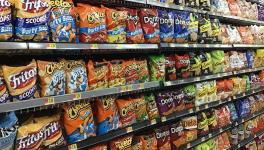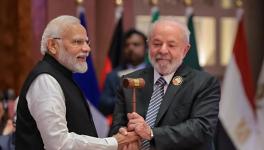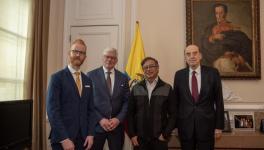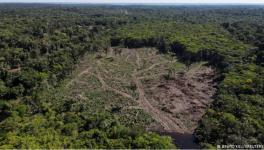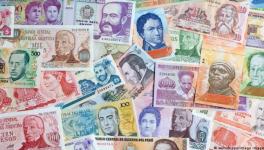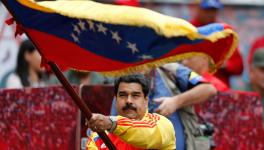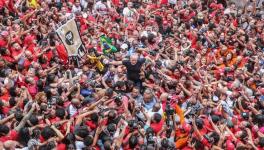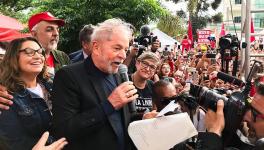Food Politics: The World can’t be Just a Huge Supermarket
There are now 7 billion human beings inhabiting the planet. More than half of them crowded into big cities. Far away from their original homes. And for the first time in history we have reached the sad total of one billion people suffering hunger on a daily basis. In other words, 14% of human beings no longer has the right to survival. Amongst them thousands of children and their mothers die every day.
The part of the population that manages to feed itself has been forced to undergo the standardization of food products. Four hundred years ago, before the beginning of capitalism, human beings used over 500 different plant species to feed themselves.
A hundred years ago, under the hegemony of the industrial revolution, these dropped to one hundred different species which underwent industrial processing after ploughing. For thirty years now, since the hegemony of financial capital in today’s world, 80% of basic human nourishment consists of soya, maize, rice, beans, barley and cassava.
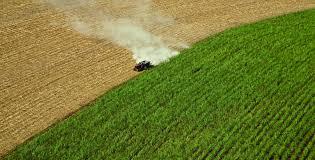
Image Courtesy: flickr.com
The world has become a single vast supermarket. Independently of where they live, people eat the same basic diet, supplied by the same business companies, just as though we were living in a huge pigsty, waiting, passively and submissively, for the distribution of our daily rations. A tragedy – concealed day after day by the media, obedient to the ruling class, who stuff themselves with a banquet of dividends, profits, bank accounts, champagne, lobster. Increasingly obese and dehumanized. Filled with injustice and iniquity. Why have we come to this? Because capitalism as a way of organizing the production and distribution of goods and peoples’ lives, based on profit and exploitation, has taken over the whole planet. Food has become reduced to the mere status of a consumer product. Whoever has the money can buy enough energy to go on living. Those who have no money don’t manage to survive. In addition, to make money you have to sell your labour if there’s someone who will buy it. Because around 100 transnational agricultural and food companies (such as Cargill, Monsanto, Dreyfuss, ADM, Syngenta, Bungue, etc.) control most of the world production of fertilizers, chemical products, pesticides, food and the sales market for these food products.
Nowadays food is sold and speculated upon on the international stock exchanges, like any raw material, like minerals, iron, oil etc, and big financial investors become the owners of millions of tons of food, which they exploit by deliberately raising prices to increase their profits. Millions of tons of soya, maize, wheat, rice, the upcoming harvests and those that don’t even exist yet, already have an owner. To fix food prices, the rules of production costs plus the cost of means of production and labour are no longer followed. Now prices are determined by the oligopoly by which business enterprises control the market, imposing the same price for a product worldwide – and in U.S. dollars. Those whose production costs are higher than this go bankrupt because they cannot recover their outlay.
In this phase of control over the fruits of fictitious financial capital, which circulates throughout the world in a ratio of five times more than its equivalent in terms of production (255,000 billion dollars in currency for only 55 thousand billion dollars of goods yearly) our natural resources, such as the land, water, energy, minerals, are transformed into pure consumer goods under its control. Ownership of land, goods, nature and food is thus hugely concentrated in only few hands.
What is the solution?
In the first place we need to renegotiate throughout the planet the principle that food cannot be reduced to a consumer product. Food is the energy of nature (sun, land, water and wind) that moves human beings, produced in harmony and together with other living beings which all constitute
the wealth of biodiversity. Everyone depends on everyone else in this collective synergy of survival and reproduction. And so every human being should have access to this energy in order to reproduce as a human being in a free and equal manner.
Governments have adopted the concept of food safety to explain this right and say that governments should provide their citizens with food. This is a small improvement compared to total submission to the market.
But we members of social movements say that the concept is insufficient because it does not solve the problem, either of food production, or of distribution and, even less so, of human rights. Because it is not enough for governments to buy food or distribute money through “family funds” to allow people to buy food.
Food continues to be treated as a consumer product, bringing a lot of profit to the businesses that sell it to governments. And people continue to be dependent and subordinate, formerly to the market and now to the government.
We uphold the concept of food sovereignty, i.e. the need, the right and the duty for every people in all territories, whether they be villages, tribes, settlements, cities, states or countries, to produce their own food. This is the practice that has guaranteed the survival of humanity, even in the most difficult conditions. It is biologically proven that everywhere on our planet energy – food – can be produced for human reproduction, starting from local conditions.
The essential question is how to guarantee food sovereignty. We need to defend the absolute necessity for all those who farm the land and produce food, farmers and peasants, to have the right to land and water. As a human right. This leads to the need for the political allocation of nature’s
resources (land, water, energy), to be shared by everyone, by means of what we call agricultural reform. We must ensure that there is national and grassroots sovereignty over basic natural resources.
We cannot let them be governed by the rules of private property and profit. Natural resources are not the fruit of human work. Therefore the State, in the name of society, must devolve them to a social, collective function controlled by society.
We need public governmental policies to encourage the practice of agricultural techniques for food production that are not predators on nature, do not use poisons and produce in harmony with nature and biodiversity, abundantly and for everyone. These appropriate practices we call Agroecology.
We must guarantee the accessibility of seeds, different breeds of animals and the genetic improvements that have been made by humanity over time, to all farmers. There can be no private ownership of seeds and living beings, as the present stage of capitalism is imposing with its brand and copyright laws, or transgenic and genetic mutations. Seeds are a heritage of all humanity.
We must guarantee that in every place, in every region, enough of the food provided by local biodiversity is produced and maintain dietary habits and local culture as a part of healthcare.
Scientists, doctors and biologists teach us that the feeding of living beings for their reproduction and health, must co-exist in harmony with the habitat and energy of the place in question.
We need governments to guarantee the purchase of all food surpluses produced by farmers and to use the power of the State to ensure they have an adequate income, whilst the food is distributed to all citizens. We must stop the multinationals continuing to control all phases of the production process and issues of agricultural production and food distribution. We need to develop the transformation of foods (what is known as the food-processing industry) in a cooperative form controlled by farmers and workers.
We need to adopt practices of international trade of food products between peoples that are based on solidarity and exchange and complement one another. No longer an oligopoly of enterprises dominated by the U.S. Dollar. The State must develop public policies capable of guaranteeing the principle that food is not a consumer product but something that all citizens have a right to.
People will not live in a democratic society with their basic rights guaranteed until they have access to the food-energy they need. Food is not a consumer product, it is a right!
Joao Pedro Stedile is the leader of the MST in Brazi
(Translation into English by Patricia Hampton)
Disclaimer: The views expressed here are the author's personal views, and do not necessarily represent the views of Newsclick
Get the latest reports & analysis with people's perspective on Protests, movements & deep analytical videos, discussions of the current affairs in your Telegram app. Subscribe to NewsClick's Telegram channel & get Real-Time updates on stories, as they get published on our website.









